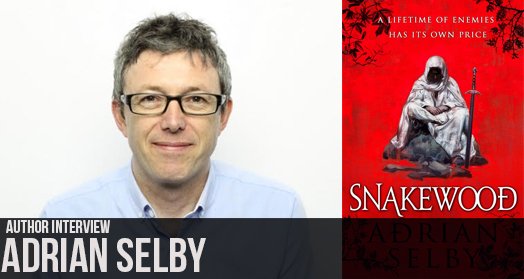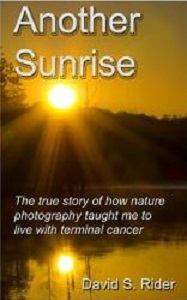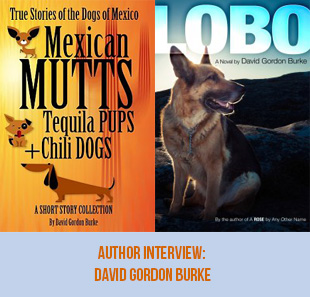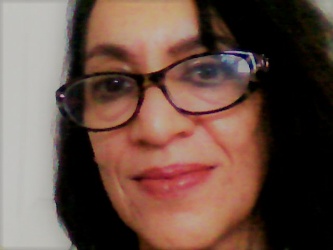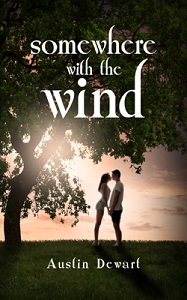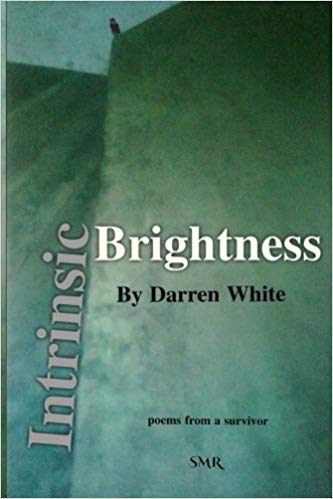Author Interview – Adrian Selby
Our next interview is with Adrian Selby, or better known to WritingForum.com members as Caragula.
Adrian, please tell us a little about yourself.
Hey, so, I’m a family man, which is great, and I’m the wrong side of 40, which isn’t. I didn’t get writing properly till my thirties, taking forever to act like the writer I wanted to be since I was eight. I did a degree in Creative Writing and Philosophy, which helped me on my way really well, and since then, back in ’92, I’ve done a number of different jobs in a number of different cities in the UK, before settling into videogame production in the southeast. Though I’m born and bred Welsh, I’m living on the south coast of England now, and it’s great to be near the sea. There’s no point in saying ‘in my spare time I like to’, because my spare time is usually full of writing, but if I get an hour to myself I’ll play some games.
Your book was released in March of this year. We know you’re ecstatic! Please share a little about the book.
The book’s called Snakewood, it’s my first novel and it’s published by Orbit. Fifteen years after the legendary mercenary crew known as ‘The Twenty’ disbanded, they are being hunted down and killed one by one. The story is told in a ‘found footage’ format; diary entries, reports and various accounts have been put together to create the narrative, but it focuses mainly on Gant, one of the Twenty, who, with his old crewmate Shale, is on the run from the assassin while trying to find out why they’re being killed and who might be left alive.
Would you share a short excerpt?
Orbit have already done it. The opening of the novel is up on their website.
Or in Audiobook format: SNAKEWOOD (Chapter 1) By Adrian Selby, Read by Joe Jameson
What inspired you to write Snakewood?
The origin of the story formed part of my Creative Writing coursework, back in ‘92. I had this idea for a treatment of magic that was very physical, rooted in nature, the flora of a fantasy world, rather than some spiritual/alternative metaphysical plane being the source of the magic. Imbibing concoctions of various plants, known as ‘fightbrews’, enables people to become incredibly strong and fast for a period of time, like a drug. But it wears off, and I wanted there to be a heavy price to pay as that’s always interesting, so these soldiers would end up like mad junkies, used up and spat out once the fightbrews had taken their toll. I knew then that I wanted to tell a story about these soldiers and their addictions and troubles. All this was influenced by the effect magic mushrooms had on me as a teenager. If something as humble as a mushroom could transform my consciousness so vividly…
I was also influenced by the brilliant comic strip Sláine in 2000AD and how he physically warped with power. My soldiers don’t “spasm” as severely, but they do physically change. Influenced too by images of warpaint, I thought it would be cool to have the brews physically change the skin and even blood, so that these soldiers could be distinguished from everyone else by the vivid and various colours of their skin, a permanent warpaint.
Another big influence was the Peter Carey novel ‘True History of the Kelly Gang’, which utilized a ‘limited narrator’ in Ned Kelly, bad grammar and all, to make it look like a telling in his own words. It was incredibly powerful and I knew that, particularly for Gant, I wanted my narrator to tell the story ‘imperfectly’ so as to make it seem more like his voice and hopefully put the reader right inside his world, as Carey had done for me with Ned Kelly.
The other important inspiration for the novel I’m delighted to say has been included as a foreword, the poem ‘An Epitaph On An Army Of Mercenaries’ by AE Housman, which I read when I was in college at that time.
What were the biggest challenges you experienced in writing Snakewood?
Pre-publication it was the research. I wanted to avoid, as far as possible, building a world and telling stories that were obviously flawed due to a lack of basic research. I’m sure the flaws that remain will be found! All I know is I spent a few years going through a number of books on various historical topics to try and ensure I at least knew the basics of medieval and dark-age life. It took me a long time with a young family and a busy job, but I didn’t want to ‘wing it’. I wanted to be as professional as possible in my approach to this novel, so that if it did fail, it wouldn’t be because I had a half-arsed attitude. If I wasn’t giving it everything, why should anyone, especially busy agents and editors, waste their time on it?
When it came to signing the deal, Orbit wanted significant additions made to the book, along with some key changes. This may sound odd, and at the time it sounded odd to me; why buy it if it’s not quite what you want? But I learned that what sold them was the raw material of the characters, story, prose and world, and they wanted more of it. So, changing the structure of something that was ‘done’ in my head was the other big challenge, but I learned an awful lot about story, editing and continuity. It was a baptism of fire. The book is, I feel, significantly better for the collaboration. I could never have conceived of such a re-telling on my own and I doubt I’d have had the appetite on my own either. I’d like to think that I’m a bit more capable now of flipping parts of a story or its characters on their head to see if anything interesting comes out, but it’s early doors in my development as an author, so I don’t imagine I’d be able to see what a story truly could be on my own, I’m just not experienced enough.
What genre would you consider Snakewood?
It’s an epic fantasy.
Tell us about your writing process. Do you plan or pants?
I’m a big planner! I like to know where I need to get to, so I spend a lot of time up front refining and refining the chapter by chapter, character bios, yet more research. I worried once upon a time that I was just procrastinating, but everything I did felt that it added some value to what I subsequently committed to the page, so I stopped worrying.
But the planning doesn’t stop there! When I come to start each chapter, I do a more detailed treatment of it. In the chapter synopsis I might write: “Gant must tell Shale about X”, but I’ll have thought about that scene, visualized it, and just before I write that chapter for real I’ll add detail to the chapter synopsislike “Shale will be angry and remind Gant that X is not to be trusted – ref. a previous incident…” and I’ll outline the incident, rather than wait till that sentence is spoken and just pull something out of the air. Of course, many many good things also came while I was spinning sentences, including the protagonist for the next novel! At times I was plotting on the fly, so I can understand ‘pantsing’ to a point, but I need a robust thread to follow, or leap from, first.
From where do you draw your inspiration?
I have very few original ideas. I haven’t, sadly, got notebooks stuffed full of plots crammed into drawers and cupboards. But, I draw inspiration from everywhere. The world building comes from history as much as fantasy and other fiction, and great fiction is a constant whip to my back to never be complacent in considering how a story should be told. When I see writers like Ian McEwan not wasting a single damn word, it inspires me to consider scene, point of view, each spoken word, each description. When I watch TV show and it makes me cry, I am thinking ‘what is it about this that is making me cry? What’s got me in the gut?’ and it might be as simple as a great actor’s face struggling with grief, which will give me a moment I can re-describe in my own context, or it could be a beautifully simple three or four lines of dialogue, perhaps a chance meeting between two characters that hit it off, and I deconstruct that for the body language, choice of words etc. Also, there’s real life, compartmentalized and filtered into the characters’ situation and biographies. Emotions are universal, you just have to surface and blend them into the gossamer threads of the sentences you’re spinning, twisting them like DNA. The idiosyncrasies of your feelings and observations on the world are, when spun this way, what makes your writing original.
How many submissions did you make to other publishers before Orbit commissioned your book?
Orbit was the first. My agent, Jamie, had a great chat with the publisher, Tim Holman, and they responded pretty quickly becauseit went down well with the editorial team in the UK and US. At that point, my agent could have gone on to auction, but suggested I consider going with Orbit because, particularly with a debut, the really important thing is getting a world-class editorialteam and organization behind the book, and me, to make the most of it and hopefully get me ‘out there’. I had no idea what the benefits would be of going with Orbit and turning down potentially more money from an auction for the publishing rights. Now I know and I’m very grateful to Jamie for thinking about the longer term, and what’s best for my development as an author. Of course, the other point here is that he was potentially doing himself out of a cut of a larger advance by going about it this way. By putting the long term at the heart of his advice, it proved to me that he was considering my career as an author and our partnership, not ‘what can I make off this guy’.
How has your publishing experience been?
Brilliant, and along the way, quite brutal!! They don’t muck about these editors. The first edit I got back was blunt in the extreme, but good and bad, the positive and lovely feedback was direct, the dissatisfaction with other bits of the book also blunt. I had to toughen up fast as an awful lot of my decision making was questioned, ideas posed to me that often elicited an ‘oh god, how did I not think that was awful?’ through to ‘no, you’re bloody wrong, it’s staying as it is!’ The latter response, however, I held back. Again, I thought to myself, ‘you’re a noob Adrian, take a moment, process what they’re saying, try to understand why they’re saying it.’ Nine times out of ten, once I’d chewed it over, I’d agree with the edit. Jenni Hill and Will Hinton are uncannily good at improving a story.
I’d had feedback during my Creative Writing degree, but also, as a producer working on video games, which are extended creative collaborations, I am quite comfortable with the idea that I didn’t have all the answers just because it was my manuscript. I’m now skeptical of anyone that does not think they need an editor making big and substantive suggestions across a manuscript.
But as challenging and stimulating as the early edits were, the experience improved from there. While I was left to make the ‘big beats’ decisions myself with advice and guidance, the words on the page were pored over many times by my editors, then many more times by a copy editor, then again by a proof reader, and each time I was invited to approve or amend based on their questions and comments. For all the collaboration, I retained full control over how Snakewood evolved. The close and extended scrutiny on the prose, continuity etc. made it shine more brightly than I’d ever have been able to manage on my own.
Tell us how your book came to be sold to a German publisher. What was that process like?
I had very little to do with that. Initially, we’d offered Orbit UK and US publication rights and we would normally retain foreign language rights. Apparently Orbit’s European and other regional sales people thought they could sell it well so Orbit offered, as an addition to the advance, to acquire the foreign language rights. The German publishers thus dealt with Orbit and I just had to confirm I was happy with the terms of the deal thatallowed them to publish Snakewood in Germany. I should say, however, that with regard to this, and all other aspects of being published, both Jamie and everyone at Orbit have been crystal clear with me and patient with my questions, explaining anything I could want explaining. Orbit have an author portal too which will track sales and other marketing activity in relation to my book(s) so I have an online look at how the book’s doing whenever I fancy. Dangerous for my health that, I think.
What role do you play in marketing your book?
So far I’ve done a short article on the origin of the magic of Snakewood on the Barnes and Noble website, a piece for John Scalzi’s blog, and one for Ragnarok Publications blog on various aspects of writing Snakewood, as well as Q&A for a few websites, of which this is one!! I guess this is a hard time insofar as nobody’s interested in an unknown yet, so you get out there and do what publicity you can. My agent’s invited me to speak ata literary festival in a few weeks, which I’m pretty nervous about having never done a panel before, and for Orbit I’ve signed a load of special editions for Goldsboro Books in London, who wanted a unique edition for themselves.
There weren’t any book signings (beyond me going into shops and guerilla signing them!) because I’m hardly a ‘draw’ for customers as a debutant. Orbit are quite happy for me to suggest things and do things as long as I keep them in the loop. We’ll see what happens in the next 6 months! I’d also like to do any SFF convention panels if possible as that’s a great way to meet readers in the genre and be able to tell them about my book too, not to mention get direct feedback on it from any of them that have read it.
Make no mistake, I don’t really know what opportunities I can/should/shouldn’t exploit beyond the above. This is very likely a failing in this day and age as an author, but as long as I learn the lessons along the way hopefully my approach will be more thorough as I go along.
Which social media platforms do you use and why?
I only use Twitter for book related stuff. My Facebook is for family and friends. I have found on Twitter pretty much everyone I feel I ought to follow (so far), and the world of publishing is on it. It seems like the main channel for this stuff. I’ve not tried any other platforms, and frankly, I wouldn’t have the time to keep up anyway, my own blog isn’t getting updated often enough due to my writing/family/job commitments as it is.
How have your blogging ventures effected your writing career?
They haven’t J I started the blog because I thought it would be useful to have one as an author, but that was an excuse. It should be obvious to anyone skimming it that the blog isn’t much of a sales tool, it’s me rambling on about things I like. I don’t know if it ought to change as my career kicks off properly in March, but I hope that I can maintain it as somewhere I get to talk about what interests me, rather than just a promotional outlet. I think it’s good if a reader that wants to find out about an author can get an (almost) marketing free window into what they love and think about. I’d rather not post something there until I have something I’m passionate to write about, but this, coupled with the lack of time, mean I don’t get to write as many posts as I’d like.
What advice can you offer to aspiring writers?
Don’t take a shortcut with anything you write. If it’s fact checking, research it, if it’s understanding your genre to know what’s cooking there, get those authors and book bloggers bookmarked and read what’s current in your field – then read widely – great stories span genres and eras, they’re all instructive.
If you’re planning to submit your work for publication, get a freelance editor to look over at least two chapters – they’ll quickly find your grammar foibles and mistakes that you will recognize instantly as likely to be occurring across the rest of your book or story. This is especially important if you’re submitting. You can’t afford for a moment to throw the agent or publisher out of your story because of poor editing or insufficient polish. Make those sample chapters sing, because the next person will and again, why leave even the tiniest thing undone when these guys are so pressed for time. I was ok with my first lot of agent rejections because I knew I’d done everything I could with my submission. Then I got lucky.
Self-publishing is cool, but exhaust the trad route first is my advice. Yes I’ve waited well over two years from signing to see the book in the shops, yes it could have been ‘earning money’ on Amazon, but now it’s getting comparatively serious publicity and care and attention, as outlined above, and it’s publicity you can only dream of as a self-pubber. It’s not like you can’t be working on the next great book while you do your subbing. Amazon is always there, it’s not going anywhere and you’ll always be able to publish a book on it if the traditional route fails.
Now that you’ve finished Snakewood, do you have another book in the works? Would you tell us about it?
I’m currently working on a novel set shortly after the end of Snakewood. Not much more to say on it for now
If you could have lunch with one author, dead or alive, who would it be and why?
JRR Tolkien – Because I want to know what Gandalf and Tom Bombadil spoke of when Gandalf stopped off on his way to the Grey Havens after the Ring was destroyed. Also, I want a definitive answer on the fates of Alatar and Pallando, and whether they might have influenced Middle-Earth in the Fourth Age.
Is there anything else you’d like to add?
I’m good. Thank you so much for the interview. I know I don’t post here as a member as often as I’d like, but there’s a great community and oodles of support at the heart of ‘WritingForums’ and these two things are the reason I keep dropping by, year in, year out.
Where and in which formats are your books available?
Snakewood is available hardback, e-book and audiobook globally (well, US, Europe, Australia and NZ).
Bio: Adrian Selby grew up in Barry, South Wales and now lives in East Sussex in the UK. He has been a qualified teacher, ran a web startup, badly, and has been a videogame producer ever since.
Twitter: @adrianlselby
Website: adrianselby.com

